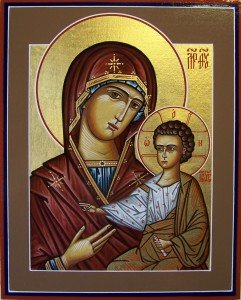 The attribution of the title of Theotokos was the only doctrinal decision taken by the church concerning Mary. However, the New Testament (NT), particularly Luke, had already proclaimed her eminent position in the economy of salvation (“henceforth all generation will call me blessed “ Luke 1:48), and, since Irenaeus and Justin, the theologians had discerned her role as the New Eve. Indeed, as Eve in paradise had, together with Adam, freely accepted the offer of the serpent, so Mary freely accepted the archangel’s announcement, making possible a new “recapitulation” of humanity in the New Adam, Christ.
The attribution of the title of Theotokos was the only doctrinal decision taken by the church concerning Mary. However, the New Testament (NT), particularly Luke, had already proclaimed her eminent position in the economy of salvation (“henceforth all generation will call me blessed “ Luke 1:48), and, since Irenaeus and Justin, the theologians had discerned her role as the New Eve. Indeed, as Eve in paradise had, together with Adam, freely accepted the offer of the serpent, so Mary freely accepted the archangel’s announcement, making possible a new “recapitulation” of humanity in the New Adam, Christ.
Preachers, poets, artists and hymnographers, using not only direct theological language but also biblical symbols and analogies, glorified her as “the earth unsown,” the “burning bush”, a “bridge leading to heaven, “the ladder which Jacob saw” and many other words and phrases. Innumerable churches were dedicated to her and icons of her became the most prominent part of popular piety, especially in the East.
The very emotionalism and exuberance of Marian piety were undoubtedly expressing a spiritual discovery of the human side of the incarnation mystery. The role of that simple woman, who conceived in her womb the new life (her virginity was a sign of this “newness”), was a reminder of the humanity of Jesus himself, and it gave in a new form the message that free fellowship and communion with God were the true expressions of authentic human nature. One of the biblical analogies of this fellowship – that of the family – was fulfilled in the particular role of Mary, as the mother not only of Christ but of all the members of his Body, the Church.
It is important to note, however, that the piety and theology of the early church never tended to separate the veneration of Mary from its Christological context. There was no doctrinal definition of her position except that of her divine motherhood. Her exaltation, after Ephesus, did not mean that he belonging to spiritually undeveloped humanity was forgotten. Well known passages by John Chrysostom, by far the most popular and authoritative father of the Greek Church, continued to be read and copied. Chrysostom frankly recognized Mary’s human failing and imperfections. She was seen, within the mystery of salvation, as the representative of humanity’s need of salvation.
